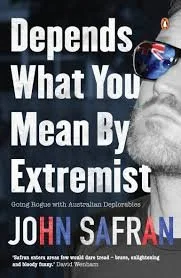Book Review: Depends What You Mean By Extremist
Depends What you mean by Extremist: Going Rogue with Australian Deplorables is the second full length literary offering from Australian satirist John Safran. Safran has worn many hats as a radio host, documentary maker, author and provocateur. In this book he is ‘John Safran, Jew detective,’ (6) leading readers through diverse communities of white nationalists, anarchists and ISIS supporters, uncovering the complexities and contradictions of the people who comprise them. Safran spent from 2015 to late 2016 among Australian fundamentalists and what he uncovered makes for compelling reading.
Early on in the book Safran remarks that ‘You really can reverse-park anything into your belief system,’ (19) and this line works as a great summation of the book’s main theme. People’s ideologies are rarely clear cut, particularly if they are based on the teachings of religious texts. The amount of cherry-picking and selective amnesia used by every one of Safran subjects in order to justify their prejudices – while at the same time defending the texts they base them around as being reasonable – is fascinating reading.
A good example of this is Pastor Daniel Nalliah, the head of Catch the Fire Ministries, and an immigrant from Sri Lanka who does not consider himself a racist or a hypocrite despite his support for a ban on Muslim immigration. Semantics play a big role in each person’s efforts to qualify their positions; be prepared to try and wrap your mind around some truly inventive justifications. The Pastor describes his views as multiracial and multiethnic but not multicultural. Safran tries to get Pastor Daniel to clarify his meaning and it’s so circular and befuddling that readers are left with a sense of the absurdity Safran is trying to convey, without his having to editorialise much at all.
That is one of the great strengths of the work. Safran doesn’t try to fit each person into a neat character type. He doesn’t summarise his thoughts on their views or provide justifications or possible explanations where there aren’t any. Unlike a socialist who Tweeted him to say that people of colour supporting white pride organisations are products of a system that ingrains self-hatred, Safran largely resists didactic assertions and lets human beings, with all their contradictions and complexities, speak for themselves.
This is not to say that a sense of Safran as a personality is absent from the book. Unlike, for example Louis Theroux whose style is to subdue his personality to the point where he almost disappears, Safran’s funny, sarcastic voice and style dominate the work and there are far more laugh-out-loud moments than one might expect from a book about racism and religious fundamentalism. Perhaps the closest to angry or personally political Safran gets is in his frustration that all of the groups he interacts with, both left and right wing are hypocritical in their disdain for or disregard of the Jewish people and their struggle. He seems especially intrigued and frustrated by Rebecca the ‘Half-Jewess’ supporter of the United Patriots Front. Despite one of its founders, Blair Cottrell, wanting a picture of Hitler hung in every classroom and Mein Kampf put on the school curriculum Rebecca spends most of the book refusing to acknowledge the possibility that Cottrell might be anti-Semitic.
People are not as easily categorised as we might like. It’s comforting to think that supporters of anti-Muslim groups like the UPF activists are bad, and No Room for Racism types are good; Safran makes it clear that it’s not that simple. Juxtaposing these groups and their supporters bares the uncomfortable truth that they are more alike than any of them would be willing to admit. Another real strength of the book is his willingness to challenge one dimensional fundamentalist thinking where he finds it, whether that is on the left or right sides of politics.
Safran shines when exposing the fragile human characters behind the grand rhetoric of the self-styled prophets he encounters. He lets people speak for themselves and resists the urge to try and overtly lead them into contradiction, because he doesn’t need to. For instance, when Nicholas Folkes (founder of the Party for Freedom and organiser of the ‘Cronulla Riot 10th Anniversary Celebration’ that Saffran attends) is unable to explain how he can run a party opposed to Asian immigration when his wife is Japanese, it doesn’t take much for Folkes’ confusion and hypocrisy to be exposed.
The book has many moments of levity and the people Safran encounters often appear foolish or pitiable making it easy to forget that their ideas are dangerous and inflammatory. With the recent rise of the alt-right movement post Trump’s victory much of what Safran writes about in the book foreshadows the political climate we are currently living in. The book concludes around the time of Trump’s election and ends on a sober note. Safran remarks that the ideas of the fringe-dwellers he has been researching are now represented in mainstream political discourse.
A timely and engaging read.
8/10

